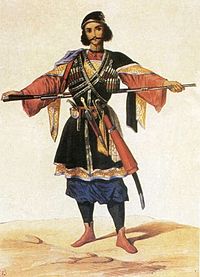Metauri: Difference between revisions
No edit summary |
No edit summary |
||
| Line 1: | Line 1: | ||
A '''metauri,''' literally ‘commander,’ was a {{wp|Georgian|Vedmedi}} noble in [[Vedmed]] and later during the [[ | A '''metauri,''' literally ‘commander,’ was a {{wp|Georgian|Vedmedi}} noble in [[Vedmed]] and later during the [[Soravian Empire]]. Metauri were wealthy landowners who served underneath a [[Mepe]]. Metauri would not only advise the Mepe on important matters of state but they would also serve as military leaders and would typically provide the bulk of the early Vedmed Military. By the 19th century metauri would be used to refer to Vedmedi cavalryman in service with Soravia. | ||
[[File:G. Gagarin. Georgian prince from Imeretia.jpg|200px|thumb|right|Portrait of an unknown Vedmed Metauri by Pyotr Tanas Sergeyevich 1841-1842]] | [[File:G. Gagarin. Georgian prince from Imeretia.jpg|200px|thumb|right|Portrait of an unknown Vedmed Metauri by Pyotr Tanas Sergeyevich 1841-1842]] | ||
Metauri would play a major role in shaping the early Vedmed Kingdom but by the end of the 16th century they were in decline as they were being replaced more and more by civil and military administrators. During the [[ | Metauri would play a major role in shaping the early Vedmed Kingdom but by the end of the 16th century they were in decline as they were being replaced more and more by civil and military administrators. During the [[Sora-Vedmedi War]] many Metauri would defect to Narozalica, securing their once lost position within Vedmed and would go on to serve in the Soravian military. Overtime with the growing need for more cavalrymen the term Metauri was expanded to include all Vedmedi cavalryman in service with Soravia, the offical title of nobility was abolished on 1861 with the rise of the Soravian Republic but the term would remain in use till the end of the [[Great War (Kylaris)|Great War]] | ||
==See also== | ==See also== | ||
[[List of Vedmedi Metauri]] | [[List of Vedmedi Metauri]] | ||
[[Category:Vedmed]] | [[Category:Vedmed]] | ||
Latest revision as of 15:04, 8 November 2020
A metauri, literally ‘commander,’ was a Vedmedi noble in Vedmed and later during the Soravian Empire. Metauri were wealthy landowners who served underneath a Mepe. Metauri would not only advise the Mepe on important matters of state but they would also serve as military leaders and would typically provide the bulk of the early Vedmed Military. By the 19th century metauri would be used to refer to Vedmedi cavalryman in service with Soravia.
Metauri would play a major role in shaping the early Vedmed Kingdom but by the end of the 16th century they were in decline as they were being replaced more and more by civil and military administrators. During the Sora-Vedmedi War many Metauri would defect to Narozalica, securing their once lost position within Vedmed and would go on to serve in the Soravian military. Overtime with the growing need for more cavalrymen the term Metauri was expanded to include all Vedmedi cavalryman in service with Soravia, the offical title of nobility was abolished on 1861 with the rise of the Soravian Republic but the term would remain in use till the end of the Great War
